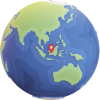Case studies are organised by region, with each region featuring links to the countries where the case studies are located.
Guyana

According to AML Intelligence, U.S. government officials have issued several warnings to Exxon Mobil, urging them to avoid business dealings with Nazar Mohamed and his son, Azruddin, two prominent figures in the Guyanese mining industry. The Mohameds are suspected of money laundering, drug trafficking, and gold smuggling. Indeed, the Mohameds are under investigation by the DEA, FBI, and Homeland Security for allegedly smuggling Colombian cocaine and Venezuelan gold, and laundering money for drug traffickers, including sanctioned Russian nationals. Reports indicate that such illegal gold trafficking funds armed conflicts and supports criminal networks. Despite these allegations, the Mohameds assert that their trade relations with American companies are legitimate. U.S. authorities have warned Exxon of such suspicions, yet AML Intelligence reports that Exxon Mobil has proceeded with a $300 million deal to build an onshore logistics base with the Mohameds in April 2022. In response, the U.S. authorities are considering sanctions against the Mohameds, which could force Exxon to sever ties with them.
Keywords: Latin America, Guyana, mining, gold, money laundering, drug trafficking, gold trafficking, smuggling, serious organised crime, terrorist and coflict financing, sanctions evasion
Sources: https://www.amlintelligence.com/2023/07/special-report-exxon-mobil-repeatedly-warned-not-to-do-business-with-mining-magnates-suspected-of-money-laundering/

In the context of Exxon Mobil’s oil extraction operations in Guyana, the article uncovers significant challenges related to organised crime and drug trafficking. The influx of foreign workers and the rapid development brought about by the oil boom have attracted criminal networks seeking to exploit the newfound wealth. These networks are involved in drug trafficking, money laundering, and other illicit activities, complicating efforts to maintain law and order. The article highlights that the oil boom has strained local infrastructure and governance, making it difficult to address the growing influence of organised crime effectively. Corruption and weak enforcement of laws further exacerbate the problem, allowing criminal organisations to flourish. The situation demands robust international cooperation, stricter regulatory frameworks, and enhanced local policing to combat the pervasive influence of organized crime and mitigate the risks associated with drug trafficking in this rapidly evolving economic landscape.
Keywords: Latin America, Guyana, minerals, serious organised crime, drug trafficking, money laundering, rule of law, corruption and bribery
Source: https://www.reuters.com/investigates/special-report/exxon-mobil-guyana/
Honduras

Cattle can both themselves be laundered (if they are grazed on land that has been illegally cleared and converted to pasture) and used as a means of laundering criminal proceeds from other exploits, like drugs trafficking. In Brazil, cattle have been laundered to obscure their links to land clearing, when they are moved from ranches that have contributed to land conversion through “clean” ranches that have not resulted in recent forest loss.
In 2009, several Brazilian slaughterhouses signed the Terms of Adjustment of Conduct, an initiative of the Federal Prosecution Office and the Public Commitment on Cattle Ranching, and a voluntary protocol developed by Greenpeace, which precludes them from purchasing cattle reared on deforested land. However, a single cow might pass through up to 10 farms before it is slaughtered (from birth, through rearing and fattening). Any of these farms might be linked to illegal deforestation but many slaughterhouses assess links to deforestation only on the last farm a cow passes through - their direct supplier. As long as the last farm in the supply chain is from a “clean” ranch that is free from recent deforestation then slaughterhouses (and subsequent transporters and retailers, like supermarkets) are likely to mark them as deforestation-free, even if they have spent the majority of their life on and have passed through nine other ranches that have been converted from forested land. Indeed, data indicates that some ranchers own both “dirty” and “clean” ranches and launder cattle through their own properties. So long as one property is kept clean, they can continue to clear land for cattle grazing purposes on any number of other ranches.
Other investigations by Global Witness have found that ranchers have fraudulently edited the boundaries of their ranch once they have cleared areas of land, so that this land conversion is no longer included within the property’s scope and the ranch appears free from deforestation. This is alleged to be the case for the Fazenda Espora de Ouro II Ranch in Brazil’s Pará state, which Global Witness also found appears to be registered in the name of an individual who could not legally be its owner (based on assessment of a database of land titles and beneficiaries).
Cattle can also – and concurrently – be used as a means of laundering the proceeds of illicit activity. Drug traffickers – especially in Colombia (where the traceability of beef produce is particularly poor), Honduras, and Guatemala – are known to launder revenue from drugs by buying or grabbing land which they convert into pasture for cattle, which they also purchase with narcotrafficking proceeds. When the cattle are sold, profits are hard to trace back to the drug network and their illicit proceeds are effectively laundered. This practice, known as “narco-ranching”, is suspected of contributing up to 87% of deforestation in the Maya Biosphere Reserve, a large UNESCO heritage area of forest which covers over 2 million hectares of rainforest across northern Guatemala and borders other protected forests in Mexico and Belize. The Reserve is highly vulnerable to deforestation by crime groups due to its strategic location along a significant drug trafficking route up through Guatemala and Mexico leading to the US.
Cattle ranching in such areas also frequently serves to hide airstrips and production facilities used by traffickers to produce and transport drugs or other illicit products. Airstrips now pepper the Maya Biosphere reserve, which are used by planes coming in from Colombia and Venezuela with cocaine to be smuggled across the border into Mexico.
Keywords: Latin America, Honduras, primary production, money laundering, illegal deforestation, human trafficking, serious organised crime
Source: https://www.vox.com/science-and-health/2022/10/19/23403330/amazon-rainforest-deforestation-cattle-laundering

Organised crime groups engaging in drug trafficking and the illicit palm oil trade often exploit environmental reserves in Honduras. There is a rapid spread of oil palm plantations in the country, as palm oil is increasingly a high earning and low production export. Palm oil accounts for about 40% of global demand for vegetable oil as both food and fuel, with annual production having more than quadrupled since 1995. Palm oil, however, presents a serious threat to the biodiversity of the wetlands and the water quality of communities, among other environmental and health threats.
Making matters worse, illegal palm oil crops are increasingly being harvested by drug traffickers and other criminals in Honduras, with illegal plantations occurring across national parks and other environmental reserves. Investment in palm oil can provide criminals with a seemingly legitimate reason to use and control land in certain areas, as well as seemingly legitimate income that can be used to launder criminal proceeds.
Keywords: Latin America, Honduras, palm oil, primary production, serious organised crime, drug trafficking, illegal deforestation, money laundering
Source: https://www.theguardian.com/global-development/2023/nov/27/deadly-harvest-how-global-demand-for-palm-oil-is-fuelling-corruption-in-honduras

In Honduras' Río Plátano Biosphere Reserve, organised crime and drug trafficking are significantly contributing to environmental degradation and social instability. The UNESCO site, vital for its biodiversity, faces rampant illegal cattle ranching and land clearing by narcotraffickers seeking to launder money through cattle farming. These criminal groups exploit the absence of effective law enforcement and weak governance, using the remote area to grow their drug operations and clear land for illegal ranching, which destroys forest habitats. Corruption further exacerbates the problem, with local authorities often complicit or powerless against these powerful criminal networks. The unchecked expansion of drug trafficking and organised crime into the reserve not only threatens the environment but also destabilises local communities.
Keywords: Latin America, Honduras, cattle, primary production, serious organised crime, drug trafficking, rule of law, illegal production
Source: https://news.mongabay.com/2018/12/there-are-no-laws-cattle-drugs-corruption-destroying-honduras-unesco-site/
Mexico

Javier Duarte, former governor of Veracruz, Mexico, is implicated in a scheme where cattle ranching was used to launder money embezzled from public funds. An investigation by Animal Político found Duarte and his network purchased expensive cattle and large ranches, using them to clean hundreds of millions of pesos. This process allowed them to integrate illicit funds into the legitimate economy by taking advantage of the agricultural sector’s cash-based transactions and lax oversight.
Duarte, who governed from 2010 to 2016, had previously been convicted in 2018 for criminal association and money laundering, receiving a nine-year prison sentence. His case underscores the vulnerability of agriculture, especially cattle ranching, to financial crimes in Mexico. The revelations reflect ongoing difficulties in curbing corruption and organised crime, which increasingly infiltrate legitimate businesses to obscure the origins of illicit profits.
Keywords: Latin America, Mexico, cattle, primary production, money laundering, agriculture, organised crime, corruption and bribery
Source: https://insightcrime.org/news/governor-cattle-money-laundering-mexico/

A report by Global Initiative details the shift in crime from drug cultivation to illegal logging in the Sierra Tarahumara region of Chihuahua, Mexico, due to decreased demand for opium gum. Drug Trafficking Organisations (DTOs) began heavily involving themselves in illegal logging around 2014-2015. DTOs can earn between MXN 50,000–70,000 per night from illegal logging, exploiting workers under threats of violence. Local mafias were also involved in this shift, albeit operating on a smaller scale compared to DTOs and rarely resorting to violence. They control logging operations, sawmills, and transportation, often involving familial clans. DTOs, on the other hand, engage in a range of criminal activities, including drug trafficking, extortion, and extreme acts of violence, including massacres and beheadings. Indigenous communities and environmental activists are heavily impacted by such threats and violence. They face displacement due to violence and land grabs by criminal groups. In addition, illegal logging and the cultivation of illicit crops contribute to significant deforestation. Finally, criminal groups use bribes and threats to secure cooperation from authorities. Local institutions often lack the resources and capacity to effectively combat organised crime.
Keywords: Latin America, Mexico, timber, primary production, illegal logging, drug trafficking, organised crime, corruption and bribery, land grabbing, Indigenous rights violations, murder, extortion, labour rights violations
Sources: https://globalinitiative.net/wp-content/uploads/2020/04/Mexican.Illegal.Logging.22.04.v1.final_.pdf

The article titled “Illegal logging takes big toll on Mexico City’s crucial forests” published on NBC News, uncovers the devastating impact of illegal logging on the forest-covered southern half of Mexico City. The forests, which recharge aquifers supplying nearly 20 million people and help clean the city’s polluted air, have been severely depleted. Alfredo Gutiérrez, a local resident, laments that the forest has been “finished off”. The article suggests that organised crime gangs may have moved into the illegal logging business, possibly due to the federal government’s crackdown on the sale of contraband gasoline and diesel. In response, Mexico City authorities have identified criminal groups behind illegal logging and have mounted operations involving hundreds of police officers and soldiers who raided clandestine sawmills in the mountains.
Keywords: Latin America, Mexico, timber, primary production, illegal logging, organised crime
Source: https://www.nbcnews.com/news/latino/illegal-logging-takes-big-toll-mexico-citys-crucial-forests-rcna102121

A report by Global Initiative details the many labour rights violations related to child labour, forced labour and discriminatory practices in Chihuahua, Mexico’s forestry sector. In Chihuahua, organised crime groups, including drug cartels, forcibly recruit individuals, particularly young people, for illegal activities, including illegal logging. These workers endure exploitative conditions that include involuntary work, forced overtime, and hazardous environments. Organised crime groups exert control over them through threats, violence, and drug addiction, fostering a climate of coercion. In addition, child labour is prevalent in Chihuahua’s forestry sector, particularly in rural areas where children often work alongside their parents to supplement family income. Children engaged in forestry work are exposed to dangerous work conditions, including handling heavy loads, exposure to sawdust, and working with machinery. Systemic discrimination against indigenous people and women is widespread in the sector. Indigenous workers are often paid less, subjected to the most dangerous tasks, and excluded from leadership positions. Women, particularly Indigenous women, face significant barriers to employment in logging and sawmill operations.
Keywords: Latin America, Mexico, timber, primary production labour rights violations, drug trafficking, child labour, forced labour, discrimination, illegal logging, Indigenous rights violations
Sources: https://globalinitiative.net/wp-content/uploads/2020/04/Mexican.Illegal.Logging.22.04.v1.final_.pdf


The article titled “Are Mexican Avocados The Next ‘Conflict Commodity’?” published on The Guardian, discusses the dark side of the booming avocado industry in Mexico. The industry, which is a multibillion-dollar one for Mexico, the world’s largest producer, has attracted the attention of organised crime groups due to its profitability. These groups engage in both extortion and direct cultivation, usually on lands taken over from local farmers or carved out from protected woodlands. The state of Michoacán, a long-standing hotbed for criminal violence, is particularly affected. The article draws parallels between the avocado industry and conflict minerals, highlighting the increasing risk of association with killings, modern slavery, child labour, and environmental degradation when dealing with Michoacán suppliers and growers. The article also mentions the rise in violence due to turf wars among more than 12 criminal groups, including the notoriously violent Cartel Jalisco Nueva Generación, fighting for control over the avocado-producing regions and transport routes1.
Keywords: Latin America, Mexico, avocados, modern slavery, child labour, organised crime, murder
Source: https://www.theguardian.com/global-development/2019/dec/30/are-mexican-avocados-the-worlds-new-conflict-commodity


The Environmental Crimes Financial Toolkit is developed by WWF and Themis, with support from the Climate Solutions Partnership (CSP). The CSP is a philanthropic collaboration between HSBC, WRI and WWF, with a global network of local partners, aiming at scaling up innovative nature-based solutions, and supporting the transition of the energy sector to renewables in Asia, by combining our resources, knowledge, and insight.


